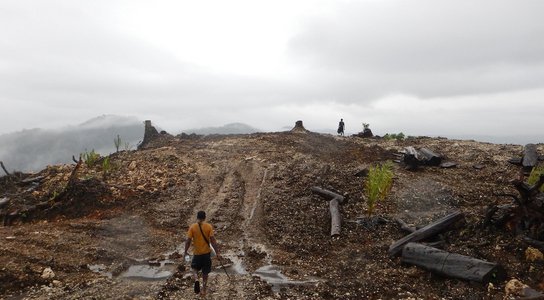EXECUTIVE SUMMARY
Across Africa, Latin America and Asia families are being forced off their land and rainforests razed to the ground – for projects backed by European money.
Companies looking for land to grow crops, for industries like oil, gas or mining, or for housing and infrastructure, rely on finance and loans from the financial institutions we in the European Union (EU) invest in. However, with few rules in place to regulate those institutions, there is little to stop them funding projects that are socially or environmentally damaging.
Global Witness, Friends of the Earth Europe (FoEE) and others are campaigning for Europe’s financial regulations to be strengthened with robust Environmental, Social and Governance (ESG) safeguards, to stop investors from propping up companies that are grabbing land, abusing human rights and causing damage to the environment.
It is commonly believed that increased regulations will reduce European competitiveness and make financial sector institutions less profitable. This belief holds that companies can keep themselves in check when it comes to their social and environmental footprint. But the reality on the ground tells a very different story. EU based investors are in fact putting themselves at significant financial and reputational risk by operating in regions where there are few guarantees, if any, that land has not been grabbed to make way for development.
The Capital Market Union (CMU) relaunch in September 2016 offers an ideal opportunity to ensure that the EU commits to fully integrating ESG factors into its financial regulation framework. Hailed as the final part of Europe’s response to the financial crisis, the CMU is the EU’s plan to develop different sources of finance to complement the banking system, to give savers more investment choices and offer businesses a greater choice of funding at lower costs.
It is our concern that without a strong regulatory framework this system risks making land-grabbing and environmental crime outside the EU even worse than it is currently by opening land and resources up to increased investment.
Other pieces of EU legislation currently regulating the financial sector at best contain only limited provisions relating to environmental and social concerns. This is the case for the Shareholders’ Rights Directive, Institutions for Occupational Retirement Provision Directive, Non- Financial Reporting Directive, Prospectus Directive, Prospectus Regulation and the Packaged Retail and Insurance-based Investment Products Regulation.
RECOMMENDATIONS
TRANSPARENCY
Legally binding requirements should be imposed on the financial industry and other companies to increase transparency. This could include, but not necessarily be limited to:
- Develop an engagement policy with companies they invest in, which requires the latter to assess the ESG risks of financed projects and take steps to avoid those risks.
- Publicly disclose, through the engagement policy as well as annual reporting systems, their exposure to ESG risks and how they are exercising due diligence to avoid such risks.
- Ensure that information identifying investors in land is made known to the communities in the area and jurisdiction in which they are located, so that they know who to seek redress from. This should include announcing land investment in the area and signage around the land itself.
- Provide information on guarantees that they have secured from companies that they do business with that they are proactively avoiding ESG risks.
ACCOUNTABILITY
Member states should:
- Ensure that financial sector institutions that do not exercise adequate ESG due diligence in any investment they promote will be held to account and liable to civil lawsuit or criminal prosecution.
- Offer opportunities for individuals and communities, outside or within the EU, to seek redress in EU country courts in line with the United Nations (UN) Guiding Principles on Business and Human Rights that call on states to remove barriers to effective legal remedy.
DUE DILIGENCE
The financial industry and companies should:
- Undertake robust due diligence, which explicitly assesses the ESG risks of current and future land-tenure holdings and other investments.
- Oblige issuers and intermediaries promoting investments in land-based projects to include in prospectuses a proof of “good title”, to ensure that the land has not or will not be grabbed.
THE EU SHOULD:
- Support work within the UN Human Rights Council to adopt a binding treaty for businesses in relation to human rights, including considerations of the liabilities of both companies and financial investors for involvement in projects which violate such rights, as well as mechanisms for accountability and redress.
- Refrain from promoting investment models that result in the large-scale transfer of tenure rights to investors, in line with Article 12(6) of the Voluntary Guidelines on the Responsible Governance of Tenure of Land, Fisheries and Forests in the Context of National Food Security (VGGT). Free, Prior and Informed Consent (FPIC) should also be secured from all affected communities, for all land and natural resource-based investments it supports through lending.
Find out more
-
Peter Drury


